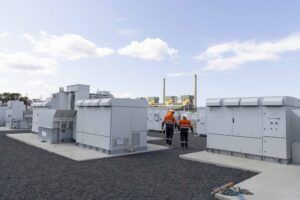Australian environment minister Greg Hunt says it is inevitable that significant numbers of consumers will leave the grid in coming years, and repeated his vow to help accelerate the deployment of battery storage.
Hunt was asked on ABC TV’s Lateline program on Tuesday – following a segment on a couple in the Blue Mountains going off-grid – if he thought that significant numbers of consumers would follow.
“I do. I think it is inevitable,” Hunt said, before noting that Australia already had the highest penetration of rooftop solar in the world – an average 15 per cent across the nation.
“Increasingly we will see the adoption of battery storage, which is the key thing to enable people to go off the grid. This is clearly the future,” Hunt said.
“The debate is how long it takes and the task for government is to help bring that forward.”
Indeed, two big international battery storage developers have chosen Australia to be their global launch pad for their battery storage initiatives. This includes Tesla and California counterpart Enphase Energy, which describes the Australian market as the most promising in the world.
Not everyone, however, agrees that consumers should be encouraged to go off-grid, and Hunt’s comments could be seen as controversial if that is what he is urging.
The reality is, however, that unless Australia’s high electricity prices, mostly in the form of inflated grid costs, can be addressed, then that is exactly what consumers will do. Most people argue, however, that the grid should be used as a “cheap battery” for all.
But that cannot be achieved, some suggest, unless the network owners (some of them state governments wishing to sell or lease the assets) accept a writedown in their value, or vastly different revenue models that will result in reduced income. The CSIRO has warned that up to one-third of consumers could quit the grid if the networks do not get their tariffs and business models right.
 Hunt repeated his comments to RenewEconomy last week that he will use the Clean Energy Finance Corporation and the Australian Renewable Energy Agency to help accelerate the deployment of battery storage in Australia.
Hunt repeated his comments to RenewEconomy last week that he will use the Clean Energy Finance Corporation and the Australian Renewable Energy Agency to help accelerate the deployment of battery storage in Australia.
Already, new battery storage offerings are being made that undercut the cost of grid-only power, and within a few years this is expected to be at a price point that offers quick pay-back, making battery storage a mass market.
This rapid uptake of battery storage means that the energy business model will shift to “decentralized” generation from the traditional centralized model. And that has major implications for the already surplus capacity of large coal-fired generators.
Hunt said that there would be no government money to support the closure of coal-fired generators, despite calls from some major utilities, such as AGL Energy, for that to happen.
He said that the renewable energy target would act as a “market forcing” mechanism that would see more large-scale wind and solar projects, and a doubling of household solar, to force out coal.
“There will be natural consolidation in the sector,” Hunt earlier told the Investor Group on Climate Change conference in Melbourne.
He pointed to the experience of Alinta, which had told him that the impending closure of the Playford and Northern brown coal generators – the only coal generators left in South Australia – was the result of the RET, and the more than 40 per cent of electricity demand now filled by wind and solar.
“In a sense, the RET is working as a market forcing mechanism,” Hunt said.
The minister noted that there had been a “capital strike” by utilities in recent years, because of their concern that the original target of 41,000GWh could not be met.
That capital strike has continued since the target was cut to 33,000GWh, but Hunt said there were signs that this was coming to an end, despite warnings from the likes of AGL that uncertainty was still there.
He pointed to the Ararat wind farm, although that is largely funded by a contract with the ACT government.
Other projects considered likely to progress include an expansion of the Greenough River solar farm in Western Australia, and some solar projects in Queensland, where Ergon Energy is holding a tender, and Origin Energy says it is looking for potential sites. Some wind farm developers, such as those behind the Ceres project in South Australia, and Goldwind in NSW are also seeking power purchase agreements.
Hunt repeated his confidence that Australia would meet – and even better – both its 2020 and the newly committed 2030 emission reduction targets, which is for a 26-28 per cent reduction over 2005 levels.
He was also confident of agreement in the upcoming Paris climate talks, where he expects a treaty to be agreed that signs up all nations to a target allowing a rise in temperatures to a maximum of 2°C over pre-industrial levels, and sets a series of five-year reviews that will encourage nations to ratchet up their commitments to meet that target.
He said he hoped that the debate could move beyond the “binary argument of whether renewable energy is ‘good’ or ‘bad’” and have a contest of policy ideas. But he noted that renewable energy investment had trailed other nations in recent year, had fallen 88 per cent and caused thousands of job losses.
He re-iterated Labor’s proposal for a 50 per cent renewable energy target by 2030, but gave no further detail on how that might be reached.
But chances of any bipartisanship on the issue of ambitious renewable energy goals appears as far away as ever. Hunt retorted by saying that target would cost $85 billion.
Hunt puts the cost of reaching around 23.5 per cent renewables by 2020 at $15 billion, and somehow arrives at a figure nearly six times higher for a doubling of that target, when the costs will likely fall. It also ignores the fact that some coal-fired generation will have to be retired by 2030 and new capacity will be needed. As BNEF reports, solar and wind provide by far the cheapest option for new generation, a point underlined by UBS recently.








